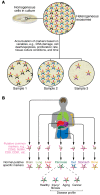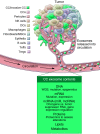The biology and function of exosomes in cancer
- PMID: 27035812
- PMCID: PMC4811149
- DOI: 10.1172/JCI81135
The biology and function of exosomes in cancer
Abstract
Humans circulate quadrillions of exosomes at all times. Exosomes are a class of extracellular vesicles released by all cells, with a size range of 40-150 nm and a lipid bilayer membrane. Exosomes contain DNA, RNA, and proteins. Exosomes likely remove excess and/or unnecessary constituents from the cells, functioning like garbage bags, although their precise physiological role remains unknown. Additionally, exosomes may mediate specific cell-to-cell communication and activate signaling pathways in cells they fuse or interact with. Exosomes are detected in the tumor microenvironment, and emerging evidence suggests that they play a role in facilitating tumorigenesis by regulating angiogenesis, immunity, and metastasis. Circulating exosomes can be used as liquid biopsies and noninvasive biomarkers for early detection, diagnosis, and treatment of cancer patients.
Figures



References
-
- Thery C, Zitvogel L, Amigorena S. Exosomes: composition, biogenesis and function. Nat Rev Immunol. 2002;2(8):569–579. - PubMed
Publication types
MeSH terms
Substances
Grants and funding
LinkOut - more resources
Full Text Sources
Other Literature Sources

